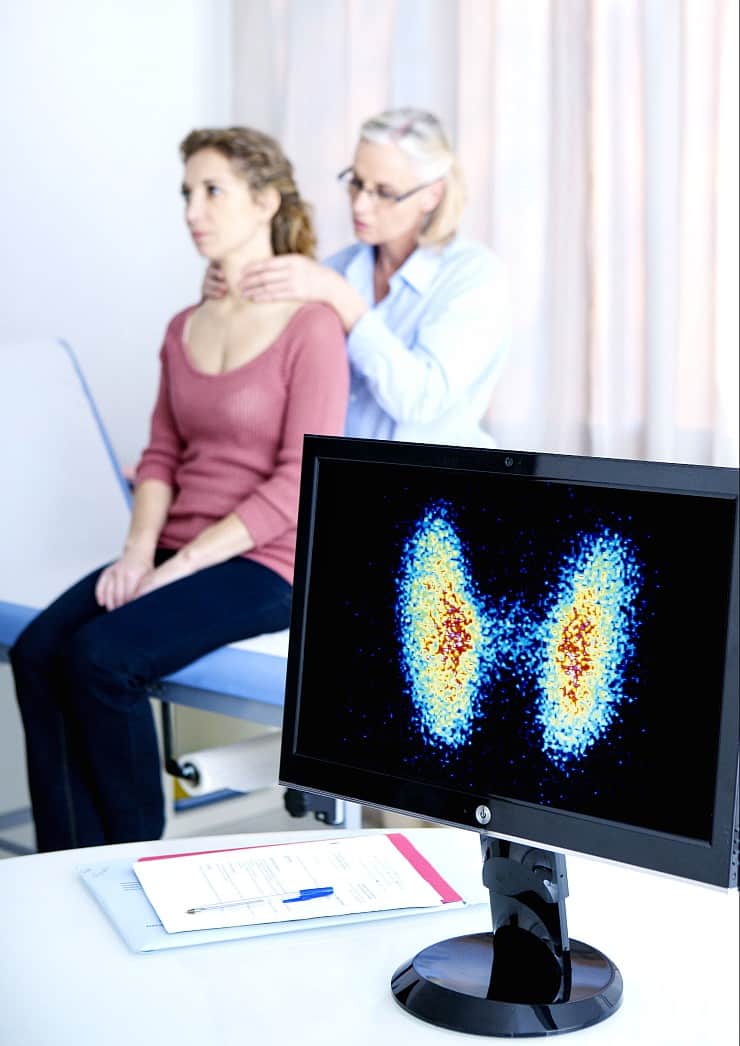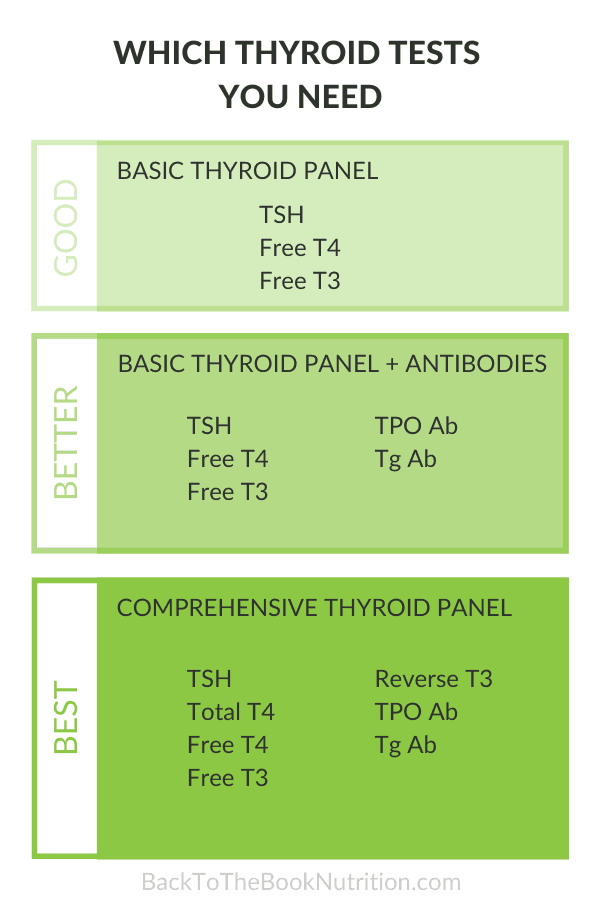Thyroid Stimulating Hormone (TSH) is just one marker of thyroid function, and doesn’t give you the full picture of thyroid health. If you’ve been told your TSH is normal, but you still have symptoms of hypothyroidism or hyperthyroidism, you may need additional lab testing. Learn which thyroid tests you really need and where to get them!

Thyroid testing is one of the topics I get the most questions about – Which thyroid tests do I need? Is TSH really enough? Should I test antibodies? What if my doctor won’t order a full thyroid panel?
If those questions sound familiar, this one’s for you!
Let’s start with a little background, then we’ll get to exactly what lab tests you need and how to get them.
Thyroid Symptoms that May Warrant Testing
How do you know whether you need thyroid testing to begin with? Below are some symptoms of Hypothyroidism (underactive thyroid), Subclinical Hypothyroidism (mild hypothyroidism with “normal” TSH), and Hyperthyroidism (overactive thyroid) that might indicate a need to order thyroid lab work.
Common Hypothyroid Symptoms:
- Weight gain or difficulty losing weight
- Constipation
- Always feeling cold
- Slower heart rate
- Dry, coarse hair
- Hair loss or thinning
- Loss of outer third of eyebrow hair
- Puffy face or eyelids
- Weak or brittle nails
- Dry skin
- Brain fog
- Fatigue
- Joint pain
- Heavy periods
- Infertility or miscarriage
Common Hyperthyroid Symptoms:
- Unexplained weight loss
- Frequent bowel movements
- Always feeling warm
- Increased heart rate
- Hair loss or thinning
- Bulging eyes
- Hand tremors
- Sweaty palms
- Anxiety or nervousness
- Light periods
- Infertility
Why Does My Doctor Only Order TSH?
The research shows that thyroid stimulating hormone (TSH) is one of the best markers of thyroid function because it’s what the pituitary gland the brain produces to tell the thyroid to make thyroid hormone (mostly T4). The body also has delicate feedback loops that tell the pituitary to adjust its TSH output up or down, depending on what else is going on in the body.
This, and the fact that insurance offers excellent coverage for TSH, are why most doctors and endocrinologists use it as a “red flag” system to see whether additional thyroid tests should be ordered. More and more, we’re seeing progressive docs who order additional thyroid tests up front, but the TSH-first approach still seems to be the norm.
Why TSH is Not Enough
The approach above works just fine in many cases. But there are two problems with only testing TSH:
- In some cases, the TSH can be normal, but other thyroid lab markers will be of range, showing there really is a thyroid problem that may need to be addressed. For example Thyroid Peroxidase antibodies (TPO Ab) can be elevated for years before TSH will be out of range.
- Many people have thyroid symptoms even when their TSH is at the upper or lower end of the “normal” range. This because the current reference ranges are just a median of TSH values of the population, including those with and without thyroid disease…in order words, they reflect typical – but not necessarily optimal – thyroid function. We sometimes refer to these people as having “subclinical hypothyroidism” or “subclinical hyperthyroidism.”
I don’t know about you, but most clients I work with are much more interested in having optimal thyroid function than typical thyroid function!
So, when my clients with “normal” TSH levels are still having symptoms of hypothyroidism, hyperthyroidism, or thyroid autoimmunity, I often suggest getting more comprehensive testing.
Which Thyroid Tests You Need
I really don’t believe there’s a one size fits all recommendation for thyroid testing, but these are some considerations to guide you. Of course, if you aren’t sure, discuss with your practitioner what tests are best for your situation.
Basic Thyroid Panel (Good):
These are the bare minimum for an accurate initial thyroid assessment, and are sufficient for ongoing thyroid monitoring in most people without thyroid autoimmunity.
- TSH – Thyroid Stimulating Hormone is released by the pituitary, signaling the thyroid to make thyroid hormone
- Free T4 – (aka: Free Thyroxine or fT4) The level of thyroid hormone that is unbound and able to be converted to active thyroid hormone (T3)
- Free T3 – (aka: Free Triiodothyronine or fT3) – The level of activated thyroid hormone that is circulating and able to be taken up by body cells to do its work
Basic Thyroid Panel + Hashimoto’s Antibodies (Better):
This is a better baseline assessment than a basic panel alone since it also helps rule out Hashimoto’s Thyroiditis. It’s the ideal choice for ongoing monitoring in those who have had elevated Hashimoto’s antibodies on previous tests.
- TSH – Thyroid Stimulating Hormone is released by the pituitary, signaling the thyroid to make thyroid hormone
- Free T4 (aka: Free Thyroxine or fT4) – The level of thyroid hormone that is unbound and able to be converted to active thyroid hormone (T3)
- Free T3 (aka: Free Triiodothyronine or fT3) – The level of activated thyroid hormone that is circulating and able to be taken up by body cells to do its work
- TPO Ab (aka: Thyroid Peroxidase Antibodies) – These are the most common antibodies produced in Hashimoto’s Thyroiditis
- Tg Ab or ATA (aka: Thyroglobulin Antibodies or Anti-thyroglobulin Antibodies) – Though not as common as TPO Ab, these antibodies can also be elevated in Hashimoto’s
Comprehensive/Full Thyroid Panel + Hashimoto’s antibodies (Best):
This is an ideal baseline assessment for those who have thyroid symptoms, and can usually be alternated with less comprehensive tests above for ongoing monitoring.
- TSH – Thyroid Stimulating Hormone is released by the pituitary, signaling the thyroid to make thyroid hormone
- Total T4 (aka: Total Thyroxine) – The total amount (bound and unbound) of thryoid hormone produced by the thyroid gland
- Free T4 (aka: Free Thyroxine or fT4) – The level of thyroid hormone that is unbound and able to be converted to active thyroid hormone (T3)
- Free T3 (aka: Free Triiodothyronine or fT3) – The level of activated thyroid hormone that is circulating and able to be taken up by body cells to do its work
- Reverse T3 – In times of stress the body can deactivate free T3, forming Reverse T3, which can lead to hypothyroid symptoms
- TPO Ab (aka: Thyroid Peroxidase Antibodies) – These are the most common antibodies produced in Hashimoto’s Thyroiditis
- Tg Ab (aka: Thyroglobulin Antibodies, Anti-thyroglobulin Antibodies or ATA, Thyroid Antithyroglobulin Antibodies or TAA) – Though not as common as TPO Ab, these antibodies can also be elevated in Hashimoto’s
Special Considerations:
- Graves’ Disease Antibodies – If hyperthyroid symptoms are present, TSH Receptor antibodies (TSHR Ab), which are sometimes called Thyroid Stimulating Immunoglobulins (TSI) can also be tested to help rule out autoimmune hyperthyroidism (Graves’ Disease).
- Testing when You’re on Thyroid Medication – Ideally, the provider who prescribed your thyroid medication should order at least a basic thyroid panel annually to monitor thyroid function and adjust your dose as needed. If you’ve recently begun medication, labs should be ordered more often (usually every 2-3 months) and dosing adjustments made as needed until your levels stabilize.
- Lab Tests for Pregnancy and Postpartum – It is normal for thyroid hormones and antibodies to shift during pregnancy and soon after birth. If your provider isn’t testing at least a basic thyroid panel with antibodies a few times during your pregnancy and at least once within the first two months after birth – especially if you have symptoms – don’t be afraid to ask!
Where to Get Thyroid Testing
My Holistic Nutrition Coaching Clients have access to all thyroid test options listed above, and are able to have their blood drawn at a lab location near them.
If you want the right testing and a personalized plan with food, supplements, and healthy lifestyle efforts to help optimize your thyroid health, I’d love to help! Schedule a free, 10 minute Discovery Call today to see if we’re a good fit!
Schedule a Free Call!
If you’re already working with a provider, but aren’t getting the testing you want, you can order your own thyroid labs at discounted prices here.
Check out these related posts!
8 Best Nutrients for Thyroid Health
5 Ways to Live Well with Hashimoto’s
Ultimate Guide to Stress Management (with free download)
Disclaimer: Information on this site is intended only for informational purposes and is not a substitute for medical advice. Always consult with a trusted healthcare provider before implementing significant dietary change. Read additional disclaimer info here.





Nice article. My best friend has been battling Thyroid issues. I will definitely share this article with her
I am that you find this helpful, and thank you for sharing. If your friend wants any further information we offer free 10 min calls:free call
Very helpful. I got my blood drawn last year and they said I was clear of this because I thought i has some of the symptoms.
I hear this all of the time, but the key is to know that the right labs were drawn. Please feel free to jump on a free 10min call with me and I would be happy to discuss: free call
Wow great article and extremely helpful. Thyroid disease is so common.
Glad you liked it Jackline!
Thanks for sharing this useful article. My aunt is facing thyroid issue I am sharing this article with her.
We are happy to hear that you find it useful, and if your aunt wants any help let her know that we would be happy to speak with her on a free 10 min call: free call
Oh wow one of my friends has Thyroid and she struggles with it!
We would be happy to help Amber. We offer free 10 minute calls that she may be interested in: free call
It’s important that we keep track of our health. Thanks for this healthy reminders and tips!
Thank you for commenting!
What an informative post! I didn’t know the importance of checking our thyroid! Thanks for the info!
Thanks for stopping by, we are glad you found the post useful!
I never realized how many different symptoms could be related to thyroids. Going to the doctor would be the best way to evaluating if someone has any issues going on related to it for sure.
So much great information. It will help so many people. Thank you for sharing x
Very interesting and informative article. I have a little understanding about Thyroid problem because my sister and my mother-in-law have it and by reading your post I was able to learned more, this is serious healthy problem that need to take seriously. I will also share this information with them, thank you!